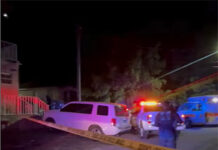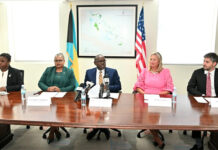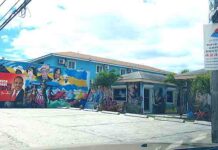The Bahamas and The United States held a Joint Drug Task Force Meeting on Friday, December 14, 2007, at the Ministry of Foreign Affairs, Goodman’s Bay Corporate Centre. Pictured are representatives from The Bahamas, the United States, and the Turks and Caicos Islands. (Photo/Raymond A. Bethel)
By: Lindsay Thompson
Plans for the establishment of Forward Operating Bases (FOBs) in Inagua, Grand Bahama and the Exuma chains are ongoing, as the country moves ahead in the fight against drug trafficking and immigration smuggling.
Deputy Prime Minister and Minister of Foreign Affairs the Hon. Brent Symonette announced this at the Bahamas/United States Joint Drug Task Force Meeting, held Friday, December 14, 2007, at the Ministry of Foreign Affairs, Goodman’s Bay Corporate Centre.
“The Government of The Bahamas remains fully committed to the total elimination of the illicit drug trade, which has had such a negative impact on our society, and we continue to show this in a tangible way,” Mr. Symonette told the meeting attended by officials from the United States Government, Turks and Caicos Islands, and The Bahamas.
Such meetings have been held for the past 20 years; a collaborative mission to meet and review the success of the joint anti-drug efforts, identify challenges and agree on strategies moving forward in the fight.
Among those in attendance at the Joint Drug Task Force Meeting were United States Ambassador to The Bahamas, His Excellency Ned Siegel; Commissioner of Police Edward Hall of the Royal Turks and Caicos Police Force; Alonzo Malcolm, Deputy Director of Immigration of the Turks and Caicos Islands and the Hon. Elma Campbell, Minister of State for Immigration, Bahamas.
“These meetings speak well to the mutual respect, trust and dedication to purpose that exist between us, both at the operational and policy levels. They also give clear indication of our understanding that no one country can counter such a grave threat to national security and stability on it own,” Mr. Symonette said.
He added, “Sadly however, the mere fact that we have had to continue to meet and to strategise for the past 20 years starkly brings to home the fact that the enemy against whom we fight has not given up its efforts to find ways of flooding our cities and communities with their poison.”
Reports from the Inter-American Drug Abuse Control Commission (CICAD) indicate that the production of cocaine, marijuana and synthetic drugs continues unabated.
“We therefore cannot, in any way, lose our resolve nor reduce our efforts to combat illicit drug trafficking,” Mr. Symonette said.
He then pointed out that The Bahamas Government remains committed to the drug fight, as it has increased budget funding to all law enforcement agencies, particularly the Royal Bahamas Defence Force.
In August two small craft were purchased, which are attached to the Nassau Harbour Unit. Six additional vessels are in various stages of construction and are expected to be completed and fully integrated into the fleet by next year.
Mr. Symonette thanked the US Government for pledging four go-fast vessels, under the Enduring Friendship Programme. These vessels are to arrive shortly and is expected to “greatly enhance” the operational capability of the RBDF.
He also noted that the Royal Bahamas Police Force and other law enforcement agencies of the respective countries continue to provide “yeoman’s service” as they seek ways to combat illegal drug trafficking and associated ills.
Another aspect that is also of most concern is the illicit traffic in arms, Mr. Symonette said. This matter was taken up in a CARICOM-United States Seminar on Combatting Illicit Trafficking in Arms, held in Nassau, December 11-12, 2007.
“Collaboration, inclusive of sharing of intelligence and the rapid development of assets as required, has been the formula for much of the success that we have enjoyed. This cooperation must continue,” Mr. Symonette said.








